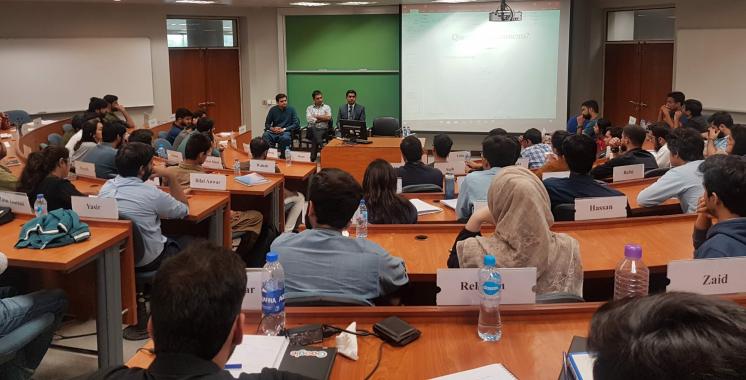
A panel discussion with senior business executives from leading manufacturers was held for MBA students at the Suleman Dawood School of Business (SDSB) at LUMS on October 18, 2019. The discussion focused on diverse topics, including changes in the business climate, challenges in scaling up manufacturing, and future prospects for expansion. The event was organised as part of the LUMS MBA Experiential Learning component, which provides students an opportunity for networking and discussion with leaders from the business community.
Featuring three speakers, the panel touched on pertinent concerns surrounding the manufacturing sector in Pakistan, exports to the Middle East and Africa, workforce retention in a city like Gujrat, and how innovation was changing local businesses.
The panel included, Mr. Hassaan-e-Muhammad, Director Sales, Original Products; Mr. Nabeel Ilyas, Director Marketing, GFC Fans, and Mr. Wasif Jamil, Director, Plasco PVC Pipe Industries Private Limited.
Chaired by SDSB Faculty, Dr. Syed Zahoor Hassan and Dr. Fahad Mehmood, the panel talked about growing competition and the fast-changing global economic environment that led to a high risk of corporate failure in market based economies. The present credit crunch and the ensuing financial crisis further increased the severity of problems faced by corporate entities. They further discussed the challenging task to achieve industrial growth in an environment plagued by an energy crisis, security concerns, rising public debts and external liabilities, widening fiscal deficits, soaring inflation, unemployment, inconsistent policies, restricted market access, and sluggish economic growth.
Mr. Ilyas discussed adequate resource allocation necessary for research and development, generation of innovative ideas, and then turning these ideas into products and services. He also elaborated how GFC Fans has stood the test of time by bringing new innovative products to the market.
Mr. Hassaan-e-Muhammad discussed the importance of consistent quality control, and the protocols that need to be in place to export polyester wadding to the foreign market. He elaborated the challenges of producing weather-resistant clothes for various customers, and the lack of skilled resources in Gujrat.
Mr. Jamil mentioned the potential of growth in the plastic pipes industry, soaring demand in Pakistan and feasibility in numerous applications, including telecommunication, oil and gas, and sewerage. He attributed the boom in this industry to the China Pakistan Economic Corridor (CPEC) and the development of housing societies in metropolitan areas of Pakistan.
The panel discussion was followed by a Question and Answer session, which allowed MBA students to enhance their understanding of the local industry. The students were eager to know how exports of fans could be increased and what innovations were being explored in the industry. They also asked the panellists about future trends in their respective industries, and how they planned to deal with manufacturing and export challenges at hand.
Dr. Hassan and Dr. Mehmood thanked the panellists for their time and insightful comments. The event concluded with an interactive networking session over tea.








